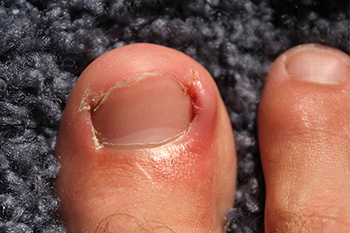
There is no mistaking the pain from an ingrown toenail. It happens when the nail grows into the skin instead of over it, causing the surrounding skin to be red and tender. If prompt medical attention is not received, the ingrown toenail may bleed, become swollen, and infected. This foot condition can happen from wearing shoes or socks that are too tight, or if a heavy object should drop on the nail. Additionally, trimming the toenails incorrectly may be a reason an ingrown toenail can develop. Patients may temporarily find mild relief when they soak the affected foot in warm water. This can help the skin to become soft, making it easier to gently pull the nail away from the skin. People who are afflicted with an ingrown toenail may choose to wear larger shoes, which can help reduce any discomfort. If the ingrown toenail is severe, surgery may be necessary in providing permanent relief. If you have developed an ingrown toenail, it is strongly suggested that you confer with a podiatrist who can effectively treat this condition.
Ingrown toenails can become painful if they are not treated properly. For more information about ingrown toenails, contact one of our podiatrists of Summit Podiatry. Our doctors can provide the care you need to keep you pain-free and on your feet.
Ingrown Toenails
Ingrown toenails occur when a toenail grows sideways into the bed of the nail, causing pain, swelling, and possibly infection.
Causes
- Bacterial infections
- Improper nail cutting such as cutting it too short or not straight across
- Trauma to the toe, such as stubbing, which causes the nail to grow back irregularly
- Ill-fitting shoes that bunch the toes too close together
- Genetic predisposition
Prevention
Because ingrown toenails are not something found outside of shoe-wearing cultures, going barefoot as often as possible will decrease the likeliness of developing ingrown toenails. Wearing proper fitting shoes and using proper cutting techniques will also help decrease your risk of developing ingrown toenails.
Treatment
Ingrown toenails are a very treatable foot condition. In minor cases, soaking the affected area in salt or antibacterial soaps will not only help with the ingrown nail itself, but also help prevent any infections from occurring. In more severe cases, surgery is an option. In either case, speaking to your podiatrist about this condition will help you get a better understanding of specific treatment options that are right for you.
If you have any questions please feel free to contact one of our offices located in Wilmington, Whiteville, and Wallace, NC . We offer the newest diagnostic and treatment technologies for all your foot and ankle needs.
